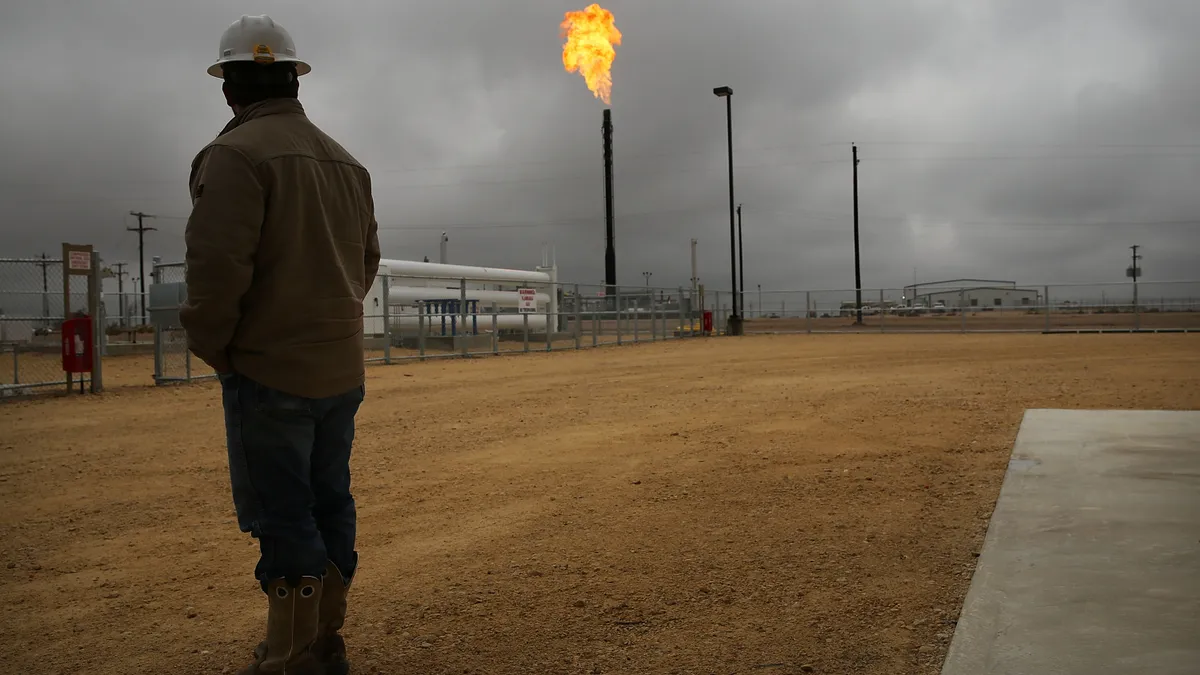Dive Brief:
- San Diego Gas & Electric (SDG&E) and Pacific Gas & Electric (PG&E) are among a group of industry players that support or do not oppose California regulators allowing — but not requiring — power providers to include natural gas in an 11.5 GW procurement order approved earlier this year.
- The utilities filed comments with the California Public Utilities Commission (CPUC) in response to an administrative law judge's ruling requesting feedback on whether gas capacity upgrades at existing plants should count toward the 11.5 GW.
- The procurement package — approved by the commission in June amid the threat of more extreme weather as well as the upcoming retirements of the 2.2 GW Diablo Canyon nuclear plant and 3.7 GW of natural gas plants — was hailed by regulators at the time as a "new, clean reliability foundation" for the state.
Dive Insight:
When the CPUC passed its 11.5 GW procurement order in June, Commissioner Clifford Rechtschaffen hailed it as a "landmark decision," noting that "This is enough to power about 2.5 million households in the state, and all this will be coming from renewable or zero-emitting resources."
The agency had previously issued two proposals to ensure power system reliability during the middle of the decade, which included between 500 MW and 1,500 MW of gas resources. However, regulators eventually approved the 11.5 GW decision that was 100% greenhouse gas-free, and opted instead to conduct more analysis before deciding whether to order additional capacity procurement.
In September, the California Energy Commission staff released a mid-term reliability analysis, which found that the 11.5 GW of procurement ordered from 2023 through 2026 would be sufficient to meet reliability targets.
However, this month, the CPUC also issued a staff paper that looked into the potential of using gas capacity upgrades to address reliability risks. The paper highlighted two areas of concern — the possibility that California's aging gas fleet could retire earlier than expected, as well as the risk that the state could be over-relying on battery storage.
In comments filed with the commission Thursday, PG&E said natural gas plant procurement should be permitted — but not mandated — as part of power providers' share of the 11.5 GW. However, the utility recommended that providers first attempt to procure clean resources, before considering gas capacity upgrades.
SDG&E supported allowing gas capacity upgrades at existing sites to count toward the 11.5 GW procurement, but pushed back against any regulatory requirement to do so — especially if that requirement were to apply only to investor-owned utilities (IOUs), as opposed to other load-serving entities in California.
"Such an approach would impose a disproportionate negative impact on the IOUs and would directly interfere with each IOU's commitment to greenhouse gas ("GHG") reduction," the utility said in its comments.
Other entities that supported procuring additional gas capacity included Calpine Corporation, the Independent Energy Producers Association and Shell Energy North America.
Clean energy advocates, however, slammed the idea of allowing gas capacity upgrades to count toward the 11.5 GW order.
"It means you're investing less in other clean resources, particularly storage and demand response," Mark Specht, senior energy analyst with the Union of Concerned Scientists, said.
Sierra Club, the California Environmental Justice Alliance and Defenders of Wildlife, in their comments, also urged regulators not to include additional gas capacity in its procurement order. According to these groups, the CPUC staff paper's analysis is based on a "narrow and oversimplified" cost assessment, which doesn't take into account impacts to GHG emissions and air quality.
"It's another day and another month, and the Commission is still asking the same tired questions about procuring more gas and expanding California's dependence on the dirty fuels that brought us the climate crisis in the first place," the groups wrote.
Some of California's community choice aggregators also sided with the clean energy groups. Allowing gas capacity to be used to substitute the renewable build ordered in the original decision "would undermine both achievement of California's long term decarbonization goals and grid reliability in the medium term," Peninsula Clean Energy Authority, Marin Clean Energy, Redwood Coast Energy Authority and the city and county of San Francisco said in a joint filing.
CLARIFICATION: This story has been updated to clarify that PG&E does not oppose allowing upgrades to existing natural gas plants as a portion of the 11.5 GW procurement.














